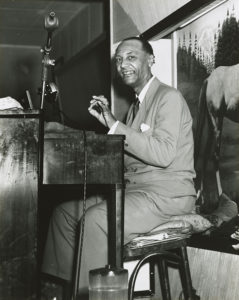Octave Crosby
Octave Crosby's Original Dixieland Jazz Band was, for a time, the house band at the legendary Paddock Lounge on Bourbon Street in New Orleans.

Courtesy of Tulane University, William Ransom Hogan Archive of New Orleans Jazz
Octave Crosby. Crawford, Ralston (Photographer)
Perhaps best remembered for his role as the pianist in Oscar “Papa” Celestin’s Tuxedo Jazz Band in the 1950s, Octave Crosby was an early traditional jazz pianist and vocalist from New Orleans. Crosby’s own band, Octave Crosby and his Original Dixieland Jazz Band, was the house band at the legendary Paddock Lounge in New Orleans, a Bourbon Street nightclub founded in 1925.
Crosby was born June 10, 1898, in New Orleans into a Creole family. As a teenager he began teaching himself drums and was soon proficient enough to play with Louis Dumaine’s dance band. When Crosby’s mother bought a piano, however, he soon switched to that instrument and took formal lessons with noted New Orleans pianist Camilla Todd. After a year of instruction, Crosby again played with Louis Dumaine, though the piano now replaced the drums as his primary instrument.
Over the next few years, Crosby played with a number of pick-up bands and served as an accompanist for silent movies at local theaters. After a tour with a traveling carnival through Arkansas with Gus Metcalf’s Melody Band, Crosby played with Chris Kelly’s band and Buddy Petit’s entertainment ensemble aboard touring boats on Lake Pontchartrain in the 1920s. A stint with Kid Rena’s band came soon thereafter, and the following years brought many other local and touring gigs with noted stars of the New Orleans jazz scene. One such gig was as a stand-in for Jeanette Kimball in Papa Celestin’s legendary band. In 1949 Crosby became a permanent member of the group after it was booked for a recurring gig at the Bourbon Street jazz haunt, the Paddock Lounge. From then until 1962, the ensemble was a fixture at the club owned by Steve Valenti, and Crosby served as the band’s leader for much of that time.
Four sessions recorded for the American Music label between 1952 and 1954 featured trumpeter Alvin Alcorn with Crosby’s band. Listed in the liner notes as the “Octave Crosby Band,” the group played on one session with Alcorn, and Jack Delaney’s New Orleans Jazz Band performed on another. These recordings, known as the “Southland Sessions,” have become famous in the history of jazz. Songs recorded for Crosby’s sessions included “Gettysburg March,” “None of My Jelly Roll,” “Ting-A-Ling,” and “Bourbon Street Blues.” Crosby also recorded with both Celestin and Bill Matthews, separately, for the Southland record label. Crosby was recorded with his own band on a trip to the West Coast in the mid-1950s.
Crosby died in New Orleans in October, 1971.
